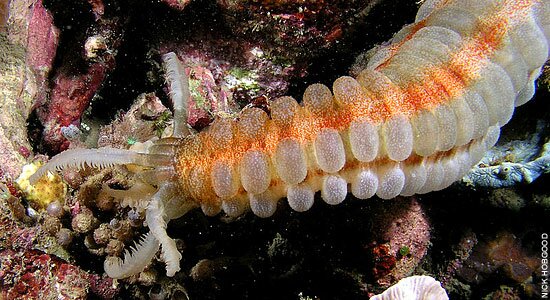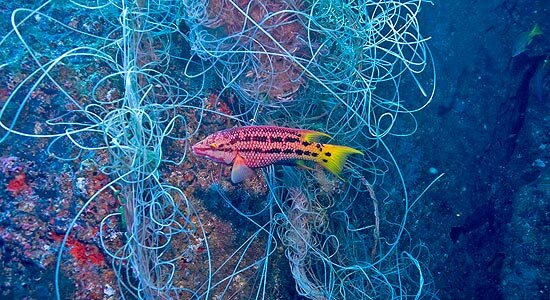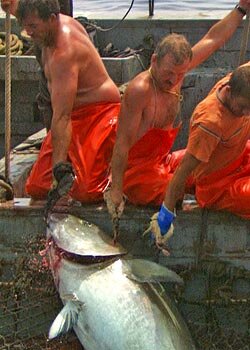The humble sea cucumber is under increasing threat worldwide, a new report warns.
- Sea cucumbers: a global review of fisheries and trade - UN FAO report
- UN FAO
Increasing demand for the cucumber – once a cheap and staple food of the poor, but now fashionable in expensive restaurants – is piling pressure on already depleted stocks.

Sea cucumber feeding at night off the Indonesian coast
The UN’s Food and Agriculture Organisation (FAO) warns in its report that sea cucumber populations across the globe, from Asia to the Galapagos, are in trouble and most high value commercial species are already depleted.
In a majority of countries looked at by the FAO and in the African and Indian Ocean regions, stocks are overfished. Similarly, in the Asian Pacific region the most sought-after species are largely depleted. Continue reading ‘UN report: Sea cucumbers face overfishing threat’

Nearly half of all fish produced for food is now farmed rather than caught in the wild, a new UN report reveals.

The biennial State of World Fisheries and Aquaculture (Sofia) report shows that stocks continue to be depleted by overfishing
The amount of fish produced by farming rose in the past two years while the number of wild fish stocks ranked as over-fished, depleted or fully exploited increased to 80 per cent of the world’s stocks.
The figures released in Rome by the United Nations Food and Agriculture Organisation (FAO) indicate that the amount of fish caught at sea has reached a plateau and may be in decline when suspected over-reporting by China is taken into account.
On the other hand, the amount of fish raised by aquaculture rose to 47 per cent of all produced for food. Continue reading ‘Farmed fish set to overtake wild caught fish for first time’

Fish must be exploited less heavily if they are to adapt to climate change, according to the UN Food and Agriculture Organisation.
Responsible fishing practices need to be more widely adopted to tackle over-fishing and fishery management plans should include strategies for coping with rising sea temperatures.
“Best practices that are already on the books but not always implemented offer clear, established tools towards making fisheries more resilient to climate change,” said Kevern Cochrane, one of the authors of The State of World Fisheries and Aquaculture (Sofia), 2009.
“So the message to fishers and fisheries authorities is clear: get in line with current best practices, like those contained in FAO’s Code of Conduct for Responsible Fisheries, and you’ve already taken important strides towards mitigating the effects of climate change.”
Climate change is already altering the distribution of both marine and freshwater species with warmer-water species being pushed towards the poles and experiencing changes in habitat size and productivity, the report says.
It is also affecting the seasonality of biological processes and altering marine and freshwater food sources which has unpredictable consequences for fish production.
A decrease or loss of locally available fish stocks will pose serious problems for communities which depend on abundant supplies for their livelihood.
“Many fisheries are being exploited at the top range of their productive capacity. When you look at the impacts that climate change might have on ocean ecosystems, that raises concerns as to how they’ll hold up,” said Cochrane.
Vulnerable communities who rely on their fishing and aquaculture industries need to take urgent action to strengthen their resilience to climate change, the report urges.
The authors of the report say that fisheries and aquaculture make a minor but significant contribution to greenhouse gas emissions during fishing operations and the transport, processing and storage of fish.
The average ratio of fuel to carbon dioxide (CO2) emissions for capture fisheries is estimated at about 3 teragrams of CO2 per 1m tonnes of fuel used.
“That could be improved. Good fisheries management can substantially improve fuel efficiency for the sector,” Cochrane said.
“Overcapacity and excess fishing capacity mean fewer fish caught per vessel - that is, lower fuel efficiency - while competition for limited resources means fishers are always looking to increase engine power, which also lowers efficiency.”
Much of the industry’s carbon footprint comes in the transport of the fish, particularly by air, once they have been harvested.
Intercontinental airfreight emits 8.5 kg of CO2 per kilogram of fish transported. This is about 3.5 times that for sea freight and more than 90 times that from local transportation of fish where it is consumed within 400 kilometres of catch.

US domestic trade legislation could be used to save the Atlantic bluefin tuna after the failure of an international body to restrict rampant over-fishing of the endangered species.
Conservationists and concerned scientists are discussing applying for a US import ban after a UN-recognised body set up to manage Atlantic and Mediterranean tunas awarded fishermen a total allowable catch in excess of what scientists recommended amid warnings that the stock could collapse.
Member nations of the International Commission for the Conservation of Atlantic Tunas awarded fishermen in the Mediterranean and Eastern Atlantic a quota of 22,000 tons this year against a scientific recommendation of 8,000-15,000 tons.
The United States is now a net importer of bluefin tuna, which would mean import restrictions against fish caught and ranched in the Mediterranean could have an effect on reducing international trade and placing pressure on other nations to follow suit.
Options being discussed by conservationists include a listing under the US Endangered Species Act and a listing under Appendix II of the Convention on International Trade in Endangered Species (CITES), which restricts trade in caviar and elephant ivory, but both of these would be hotly opposed by fishermen and fishing nations.
A resolution by the UN general assembly to reduce catches of bluefin tuna is another option under consideration.
Andrew Sharpless, executive director of Oceana, said: “ICCAT has shown that its true name is I CAN’T. It can’t find the courage to save the bluefin tuna from being commercially hunted and killed to where it is in danger of disappearing forever. Continue reading ‘US trade embargo could save bluefin tuna’


![]()




